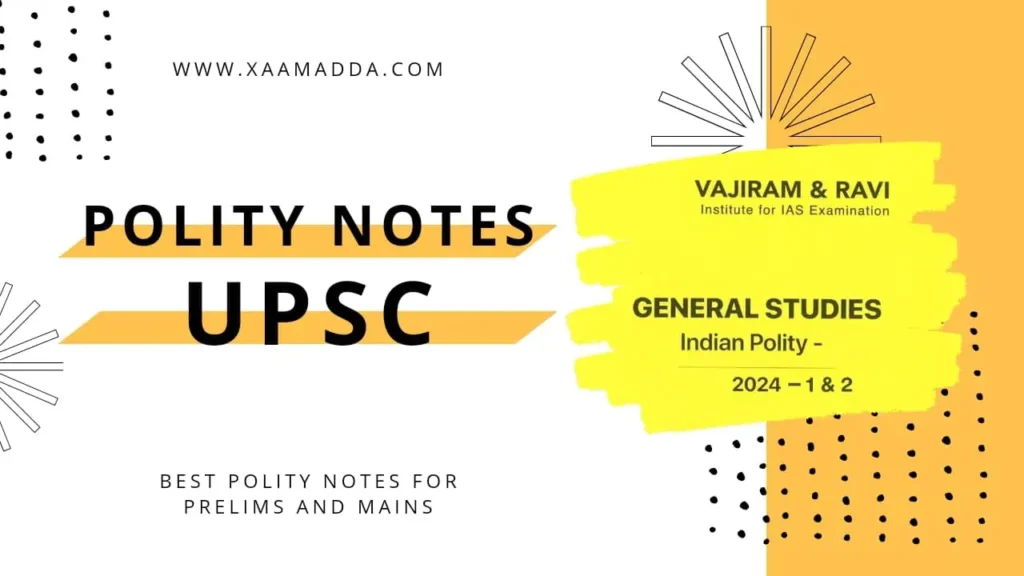Polity is one of the most important subjects for the UPSC IAS exam. It covers the topics related to the Indian Constitution, the organs of the state, the governance system, the fundamental rights and duties, and the various issues and challenges in the Indian polity. In this blog post, we will provide you with the best polity notes for UPSC, which will help you to ace this subject in both the prelims and the mains exam.
Polity Notes for UPSC: What are they and why do you need them?
Polity notes for UPSC are the concise and comprehensive notes that summarize the key concepts, facts, and information related to the polity syllabus of the UPSC IAS exam.
They are based on the standard books, previous year papers, current affairs, and the guidance of the experts and toppers.
They are easy to understand, remember, and revise.
Polity notes for UPSC are essential for your UPSC IAS preparation because they can help you to:
- Save time and effort by avoiding unnecessary and irrelevant material.
- Focus on the core and essential topics and areas of the polity syllabus.
- Revise and recall the important points quickly and effectively.
- Enhance your answer writing skills and presentation.
- Boost your confidence and motivation.
How to get Polity Notes For UPSC?
There are many sources and platforms where you can get polity notes for UPSC. Some of them are:
Online websites and portals: There are many websites and portals that provide polity study material for UPSC for free or at a nominal cost. You can download them in PDF format or view them online. Some of the popular websites and portals are:
[Vajiram & Ravi]: Vajiram & Ravi is one of the leading coaching institutes for UPSC IAS exam. It provides polity notes for UPSC for various topics, such as Indian Constitution, Fundamental Rights, Parliament, President, Prime Minister, Judiciary, and more. You can access them from their website or their app.
[BYJU’S]: BYJU’S is one of the largest online learning platforms in India. It provides polity notes for various topics, such as Indian Constitution, Fundamental Rights, Parliament, President, Prime Minister, Judiciary, and more. You can access them from their website or their app.
[Cracku]: Cracku is a platform that provides polity notes for UPSC in PDF format. It covers the topics of Indian Constitution, Fundamental Rights, Parliament, President, Prime Minister, Judiciary, and more. You can access them from their website.
Offline sources: There are also some offline sources where you can get polity notes for UPSC, such as:
Coaching institutes: Many coaching institutes for UPSC IAS exam provide polity study for UPSC to their students. You can join them or buy their notes from their centers or online platforms.
Bookstores and libraries: You can also find polity notes for UPSC in some bookstores and libraries that cater to UPSC IAS aspirants. You can buy them or borrow them from there.
Friends and seniors: You can also get polity notes from your friends and seniors who have cleared the UPSC IAS exam or are preparing for it. You can ask them to share their notes with you or lend them to you.
How to use Polity Notes For IAS Preparation?
Getting polity notes for UPSC is not enough. You also need to know how to use them effectively for your UPSC IAS preparation. Here are some tips and suggestions on how to use polity notes for UPSC:
Read and understand: The first step is to read and understand the polity notes thoroughly. You should try to grasp the main idea, concept, and logic behind each point and topic. You should also try to relate them to the current affairs.
Make your own notes: The second step is to make your own notes based on the polity notes for UPSC. You should not copy them blindly, but rather use them as a reference and a guide. Aspirants should make your own notes in your own words and style, and add your own examples, diagrams, and illustrations. You need to update your notes with the latest information and data from reliable sources, such as newspapers, magazines, and online platforms.
Revise and practice: The third step is to revise and practice the polity notes for UPSC regularly and before each mock test and exam. You should revise them at least once a week, and before each mock test and exam. IAS aspirants should also practice writing answers and essays based on the polity study material for UPSC. You should try to improve your speed, accuracy, and presentation.
Write your answer in a balanced and objective manner. You should also mention the pros and cons, advantages and disadvantages, or different perspectives of the issue if required.
Review your answer and check for any mistakes or gaps. You can also get feedback from your mentors, peers, or online platforms to improve your answer.
The Bottom Line
In conclusion, polity notes for UPSC are a valuable resource for the candidates who are preparing for the UPSC IAS exam. They can help you to save time, focus, revise, and write better. However, you should also use them wisely and smartly, and not rely on them completely. You should also supplement them with other sources and materials, such as standard books, previous year papers, current affairs, and the guidance of the experts and toppers.
Remember: polity study material for UPSC are a means to an end, not an end in itself!
We hope this blog post has helped you to understand how to get and use Indian polity study material for UPSC for your UPSC IAS preparation. If you have any queries or feedback, please feel free to comment below. We would love to hear from you!
For more tips and strategies on UPSC IAS preparation, please visit our website or follow us on our social media channels.
All The Best!
